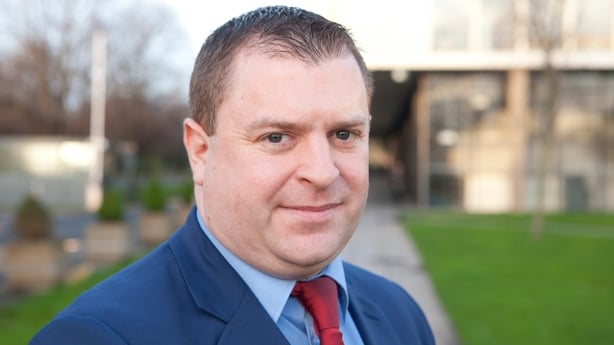From "the Three Amigos" to rolling out the red carpet for Donald Trump, to the emperor with no clothes, it was a wide-ranging debate in Limerick last night. So how did the party leaders perform?
The smaller parties had more at stake here as they are not part of the other TV debates. Did they cut through the noise in a crowded field?
And with seven leaders in the battle, did any of them gain significant momentum. Reporting from the University of Limerick, Conor McMorrow of RTÉ's Political Staff assesses how the party leaders performed.
Enda Kenny, Fine Gael
The Taoiseach did not drop the ball. He did what he needed to do and there were no gaffes. But he certainly did not convert any scores from the sideline.
There was no standout moment. The limitations of a seven-person debate probably made it difficult for any leader to gain momentum last night. Like the other leaders, the Taoiseach certainly will not see a surge in support on the back of the debate.
As expected, he worked the Fine Gael "keep the recovery going" slogan into his first answer and gave it a few more mentions.
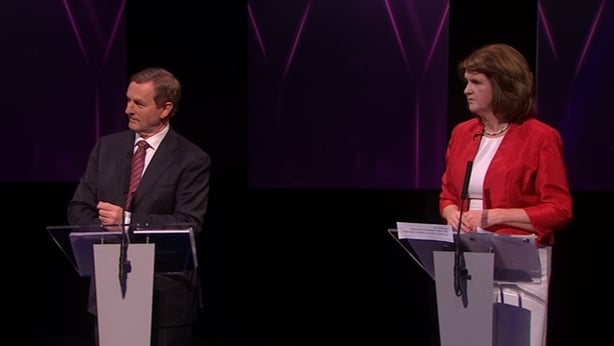
Last week, he attacked Gerry Adams and this time around he focused his attacks on Micheál Martin.
He said Mr Martin brought "despair and disillusionment" to the country.
He said he did not know whether to take the Fianna Fáil leader seriously on rural crime when his party closed the Garda training college in Templemore.
In another attack, he reminded people of what Mr Martin said in 2002 when he was minister for health that he would "permanently abolish waiting lists within two years".
The Taoiseach was not definitive about his position on Fianna Fáil as a possible coalition partner over the weekend. But last night he ruled it out. He said that people have not forgiven Fianna Fáil.
Mr Kenny ended the debate where he started with – "keep the recovery going" and "now is not the time to put the recovery at risk". More of the same is expected between now and polling day.
Joan Burton, Labour
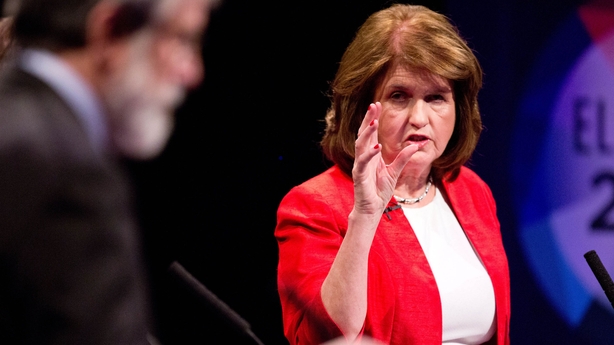
Joan Burton performed marginally better than last week's debate on TV3. But did she score enough political points to win back large swathes of voters for her party? Probably not.
Fianna Fáil's backroom team will see the attacks on the party as a sign that it is doing something right in this campaign.
The Tánaiste attacked Fianna Fáil leader Micheál Martin and pointed to his time in government where "like the emperor with no clothes he is pretending that Fianna Fáil's past never happened".
When Mr Martin mentioned former junior health minister Róisín Shortall's departure, the Tánaiste handled what could have been an awkward situation quite well. She said: "Róisín Shortall is a very fine politician" but added, "she should have stayed here to make it work".
Ms Burton had a good cutting jibe at Stephen Donnelly when she said: "You're all management consultant speak." Some of her answers were a little long-winded. She may have benefited more from clearer concise answers.
On a night when the Tánaiste needed to differentiate her party from the rest, she asked "progressive voters to vote for the Labour Party and then give their number two to Fine Gael".
Stephen Donnelly hit back with the comment that Labour is the only left-wing party in Europe that is asking people to vote for a right-wing conservative government.
Next week's debate will have huge importance for Labour's fortunes, given that the Tánaiste did not make up significant ground last night.
Micheál Martin, Fianna Fáil
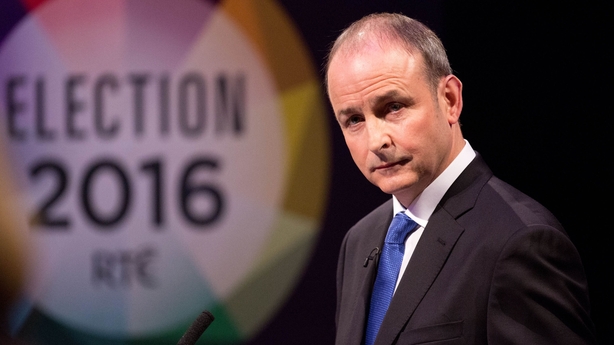
He started with a scattergun approach where he attacked Fine Gael and Labour for breaking promises.
He cited Ruairi Quinn's pledge on university fees, James Reilly's pledges on prescription charges and the junior coalition party's mantra - "Frankfurt’s way or Labour's way".
This was soon followed with attacks on Gerry Adams who "has been denying for 30 years that he was a member of the IRA".
His comment that Dublin represents 40% of the country's GDP and the economy is "totally lopsided" will resonate well with rural voters, but maybe not as much in the capital where Fianna Fáil desperately needs to make inroads.
His connections with the economic crash and Fianna Fáil's record in government, continues to be his Achilles heel.
The image of him dropping his notes and Enda Kenny pointing them out on the floor caused a flurry of social media activity.
Lending a helping hand? #leadersdebate #ge16https://t.co/hQsFMUa7uM
— RTÉ News (@rtenews) February 15, 2016
In last week's debate, he was widely lauded as the clear winner. He did not win last night's debate but he did not lose a huge amount of ground either.
Gerry Adams, Sinn Féin
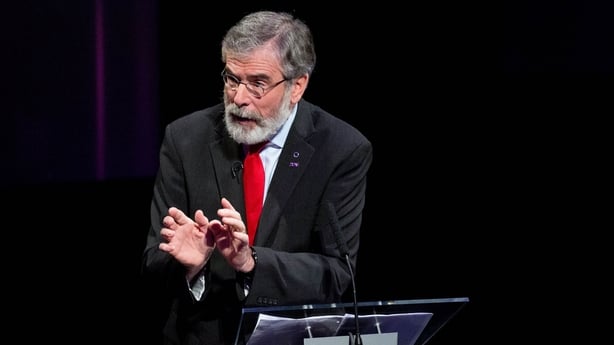
Gerry Adams got the first laugh of the night from the audience when he labelled the Fianna Fáil, Fine Gael and Labour leaders as "the Three Amigos".
He said Micheál Martin was 15 years in cabinet where "they created the mess and wrecked the economy".
He claimed the Taoiseach and Tánaiste were elected on an entirely different agenda and they implemented Fianna Fáil's four-year plan.
Mr Adams was asked again if he was a member of the IRA. Mr Martin hit him hard. But Mr Adams deflected questions about the IRA and crime better than last week's TV3 debate.
He did not take the same pummeling he got last week about his party's position on abolishing the Special Criminal Court.
That said, middle-class floating voters will not flock to Sinn Féin after the debate either.
His comments about re-opening rural Garda stations will be welcomed.
He did not excel when it came to the finer details of policy but there were no major gaffes.
He returned to his "three Amigos" analogy at the end of the night and urged Ms Burton, Mr Martin and Mr Kenny to "get on their donkeys and ride into the sunset".
Lucinda Creighton, Renua
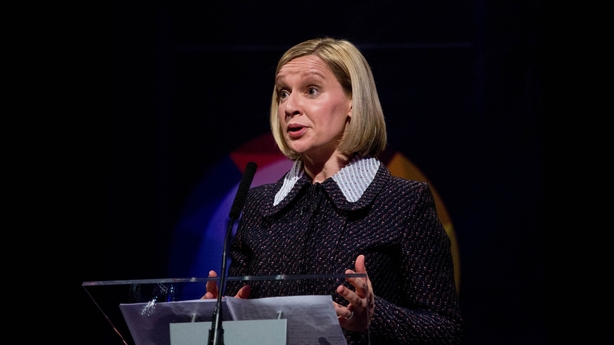
Last night was a good opportunity for the smaller parties to set out their stall.
The first audience question asked if the political parties could be trusted given that election promises have been broken in the past.
Renua leader Lucinda Creighton answered: "I am standing on the stage as the only politician who has given up high office because of a promise."
She unintentionally garnered a few laughs with her interaction with Mr Martin when she said: "I am trying to make a point. You may disagree with it. But it's true."
She kept saying that Renua is the only party with a credible alternative. She was probed on Renua’s solution for solving the housing crisis.
Undoubtedly the issue where she will have made the most lasting impression with her contributions was on crime. "We make no apologies for saying that serious criminals should be taken off the streets," was one of her well-received comments.
Her overriding message was that "we need a change of culture".
She concluded: "We are committed to ending cronyism. Our promise is to keep our promises and tell the truth."
The question for Renua after last night is probably the same question that Renua had before the campaign: Does the party’s message resonate with a broad enough audience?
Richard Boyd Barrett, Anti-Austerity Alliance/People Before Profit
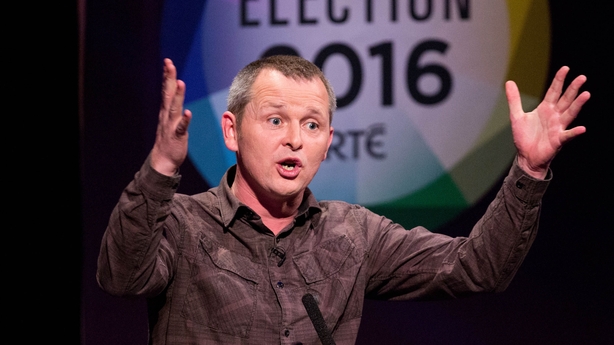
He was proof of the argument that it is easier to do well in one of these debates when you are in opposition.
Richard Boyd Barrett was the only leader to bring up the repeal of the Eighth Amendment when he said the AAA-PBP wants to "end discrimination against women where they have the right to control their own bodies and repeal the eighth amendment. We are about people power."
On the housing crisis, he pointed out that Ireland was "able to provide council housing for people when this country was a lot poorer in the 1950s and 1960s".
He drove home the message of taxing the wealthy and the highest earners. He said that there is a two-tiered system where healthcare is given out on the basis of "the size of your wallet".
In a clear attack on the Government's JobBridge initiative, he said: "We welcome any job as long as it is properly paid. We don't welcome these pretend jobs."
He was critical of the rates of pay for new entrant nurses. These arguments drew loud applause.
Given that this will be his only leaders' debate appearance, Mr Boyd Barrett will be satisfied to have delivered enough salient points that people like to hear.
Stephen Donnelly, Social Democrats
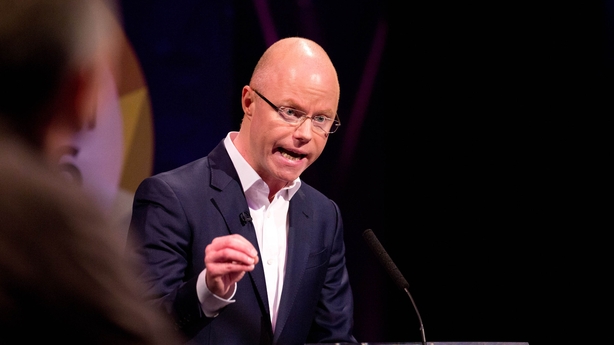
Stephen Donnelly offered a clear simple message. He is good at pitching the Social Democrats as a respectable and reasonable alternative voice.
"No, you can't trust the political establishment. You are being offered a false promise," was among his opening remarks. He warned against abolishing the USC as it is needed "for a stable tax base".
He may not have greatly elaborated on the details of his proposal for an Irish NHS (National Health Service), but there is a market for his labelling the current system as "utterly dysfunctional" and "a system designed for the 1930s".
People involved in the small business sector will welcome his criticism of the "over-reliance" on the multinationals and he claimed that "Ireland's political system does not understand business. They are being buried in red tape and they can't access funding."
He attempted to set the Social Democrats apart from the rest by accusing the established parties of "faux outrage".
He said businesses were not being provided with money on one hand, while Donald Trump arrived to buy one of Ireland's golf courses and he was "met at the end of a red carpet by dancing girls and harpists".
While Mr Donnelly said his party will not be "the mudguard for anybody", he did say: "Anyone who is interested in bringing this country on a better path - we will talk to them."
Overall assessment
Did this debate provide any game-changing moments in the Election 2016 campaign? No.
But it did allow the smaller parties to set out their stall. The standing of the four larger parties is not likely to move on the back of last night's debate as their attention will return to the election trail ahead of next week's final TV debate.
By Conor McMorrow, RTÉ's Political Staff
